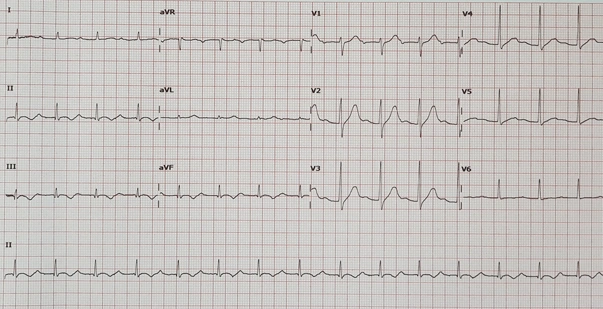Table of content(s)
- What is a first-degree AV block on ECG?
- How is first-degree AV block diagnosed?
- What are the symptoms of first-degree AV block?
- What are the treatment options for first-degree AV block?
- Can first-degree AV block lead to more serious heart conditions?
- What are the risk factors associated with first-degree AV block?
- How does first-degree AV block impact patient outcomes?
- Are there any lifestyle changes that can help manage first-degree AV blocks?
1st degree AV block is a slight delay in the heart’s electrical system. This condition is characterized by a prolonged PR interval on an electrocardiogram (ECG), which is the time between the start of the P wave (representing atrial depolarization) and the start of the QRS complex (representing ventricular depolarization).
In some cases, it can lead to heart failure and even death. Studies show a higher risk of atrial fibrillation and heart failure in these patients. Treatment depends on symptoms, whereas pacing is considered in chronic cases. In general, most patients with first-degree AV block do not need treatment unless symptoms are severe. Pacemakers are usually not recommended as per ACLS guidelines unless the PR interval is very long and symptomatic. So, let us explore the role of pacemakers in AV block, diagnosis and line of treatment to be followed.
Master ACLS Now
Get ACLS certified with confidence
What is a first-degree AV block on ECG?
A first-degree atrioventricular (AV) block is defined as a prolongation of the PR interval on an electrocardiogram (ECG) beyond 0.20 seconds without disruption of atrial to ventricular conduction. The normal PR interval ranges from 0.12 to 0.20 seconds.
When the PR interval extends beyond 0.30 seconds, it is considered “marked.” First-degree AV block is generally asymptomatic and often does not require treatment beyond regular monitoring However, it is associated with an increased risk of developing atrial fibrillation.
How is first-degree AV block diagnosed?
First-degree AV block is diagnosed by:
- Electrocardiogram (ECG) showing a PR interval >0.20 seconds without atrial to ventricular conduction disruption.
- History and physical examination focusing on heart disease, family history, and symptoms.
- Further diagnostic evaluation in symptomatic patients or those with associated heart disease.
- Rhythm monitoring with insertable cardiac monitors in certain cases.
- Echocardiographic techniques for prenatal diagnosis in fetuses with irregular cardiac rhythm.
What are the symptoms of first-degree AV block?
First-degree AV block is usually asymptomatic but can present with symptoms in severe cases. The symptoms include:
- Dyspnea
- Malaise
- Lightheadedness
- Chest pain
- Syncope
- Symptoms similar to pacemaker syndrome
- Discomfort due to atrial contraction against closed atrioventricular valves.
What are the treatment options for first-degree AV block?
Treatment options for first-degree AV block include:
- In general, patients with first-degree AV block do not require treatment unless they have underlying conditions.
- Permanent pacemaker implantation is an option for patients with severe symptoms similar to pacemaker syndrome or hemodynamic compromise.
Can first-degree AV block lead to more serious heart conditions?
Yes, first-degree AV block can lead to more severe heart conditions. Studies show that it is associated with an increased risk of heart failure, pacemaker implantation, and even death. Patients with first-degree AV block are at a greater risk of death, stroke, or heart failure hospitalization, and they may also have a higher incidence of atrial fibrillation. Therefore, close monitoring and potential interventions are needed to prevent the progression of more serious heart conditions.
Read more: Second-Degree AV Block Type I: Recognizing the Signs and Symptoms
What are the risk factors associated with first-degree AV block?
Risk factors associated with first-degree AV block include age, male sex, metabolic factors, and cardiovascular conditions. The risk factors include:
- Age and Sex: Older age and being male are positively associated with first-degree AV block.
- Metabolic Factors: Higher body mass index, hypertension, diabetes, and low high-density lipoprotein cholesterol are linked to an increased risk of first-degree AV block.
- Cardiovascular Conditions: Conditions like hypertension, myocardial infarction, and congestive heart failure are independently associated with first-degree AV block.
How does first-degree AV block impact patient outcomes?
First-degree AV block is now recognized for its potential to lead to adverse outcomes like heart failure, pacemaker implantation, and mortality. It may require interventions like pacemaker placement in severe cases. Let us explore more insights in the table below.
| Outcome | Impact |
| Mortality | Patients with PR interval >200 ms had a higher hospital mortality rate (26.9%) than those without (4.7%). |
| Heart Failure | First-degree AV block is associated with an increased risk of heart failure, pacemaker implantation, and death. |
| Symptoms | Severe first-degree AV block may produce symptoms similar to heart failure due to AV dyssynchrony. |
| Clinical Outcomes | First-degree AV block is an independent predictor of poor clinical outcomes, including death, stroke, or heart failure hospitalization. |
Are there any lifestyle changes that can help manage first-degree AV blocks?
Yes, lifestyle modifications can be beneficial in managing first-degree AV blocks. Here are some changes that can help:
- Regular Exercise:
Maintaining a healthy weight and regular physical activity can improve heart health and overall well-being.
- Healthy Diet:
Eating a balanced diet rich in fruits, vegetables, whole grains, and lean proteins can support heart function.
- Stress Management:
Stress-reducing techniques like meditation or yoga can help lower stress levels, benefiting heart health.
- Avoiding Stimulants:
Limiting the intake of stimulants like caffeine and tobacco is also beneficial for heart rhythm.
- Regular Monitoring:
Routine follow-ups with healthcare providers for monitoring and assessment are essential to track any changes in the condition.
Read more: ECG tutorial: Basic principles of ECG analysis
Conclusion
1st degree AV block can lead to serious heart conditions like heart failure which might need pacemaker implantation. Lifestyle changes and monitoring are key for management. Patients with this condition need close monitoring for potential interventions. Therefore, understanding the impact of first-degree AV block is crucial for better outcomes.







